One of the biggest problems with movies these days is the fact that so few of them are truly subversive, in any sense of the word. That’s right. Films today are not subversive enough.
We live in a screwy society. Rich criminals get to drive their limousines to the golf course. Poor criminals spend decades in filthy, violent prisons. The Third World sends the First World more cash in debt repayments than we send them in foreign aid. Schools are allowed to shove advertising down the throats of our students. Everyone sues each other over the slightest problem. What we need is something that undermines this state of affairs. We need more subversion, not less.
Oh, many directors like to see themselves as subversive, or at least, “shocking”. But these days, “shocking” refers almost exclusively to special-effects enhanced gore and splatter, or frontal nudity. “Natural Born Killers” comes to mind. For all the pompous strutting about by Oliver Stone, proclaiming, with every jiggly camera angle, with his incoherent script, and abrupt uneven edits, that this film “rocks”, “Natural Born Killers” is an utterly conventional film. The police generally behave like the criminals because our society believes that that’s the only way to deal with criminals, and the media try to exploit both sides. Everyone is trying to get something, and the preferred strategy is confrontation and violence. Instead of challenging the viewer’s assumptions about reality, “Natural Born Killers” merely affirms our most paranoid assumptions. It is an utterly boring film. It is a conformist film. Most people would walk out of the theatre without a single new thought in their heads.
Critics frequently toss around adjectives like “bold” and “shocking” when some new film reaches for new heights of explicit violence or sex. What is bold or shocking about that? It has been almost 30 years since “Bonnie and Clyde”, with its celebrated slow-motion machine-gunning of Beatty and Dunaway in that elegiac last scene. Since then, it’s been largely more and more of the same, to the point where explicitness can no longer be said to be subversive at all. Even drug movies, like “Trainspotting”, really don’t tread any ground that hasn’t already been stampeded through by “Midnight Cowboy”, “H”, “Drugstore Cowboy”, “Sid and Nancy”, or even “Days of Wine and Roses”. Been there, done that. What else can you show me?
There are a few, of course. Terry Gilliam’s “Brazil”. Todd Solondz’ “Happiness”. Maybe “Bulworth”. But “Brazil”, as imaginative and original as it is, still ends up telling us something we already know: mindless bureaucracies suppress individual freedoms. “Happiness” is more interested in personal emotional fulfillment than society. “Bulworth” suggests that the fundamental institutions of our society need merely be reformed.
You might be surprised to learn that one of the most subversive films ever made in the United States is almost 50 years old. It is Charlie Chaplin’s “Monseiur Verdoux”.
“Monseiur Verdoux” is based on the life of the infamous Henri Desire Landru, the French serial killer. Landru seduced over 400 women and murdered 10 of them. He was executed by guillotine in 1922.
Orson Welles thought it would be interesting to make a film of his life and suggested the idea to Chaplin. Chaplin fictionalized the story somewhat, to suit his own purposes (he wanted explicit links to the depression and World War II). But the most sensational aspect of the case remains intact: a supposedly rational, ordinary man makes a business out of marrying wealthy spinsters and widows so he can murder them and keep their money. The real Landru disposed of the bodies, sometimes, in an outdoor stove. So does Chaplin’s Verdoux. Neighbors in both accounts noticed the smoke for days but thought that nothing was amiss.
In Chaplin’s version, Monsieur Henri Verdoux is a former petty clerk at a bank with a charming wife (Chaplin, in one of his rare misjudgments, put her in a wheel chair—are we supposed to feel more warmly towards him now?) and young child. He lived a honorable, petty little life in the South of France until the faceless administrators at the bank decided to restructure and he was tossed out of his job. Until this point in his life, he resembled T. S. Eliot’s J. Alfred Prufrock, who “measured out” his life “in coffee spoons”.
Facing dire poverty, Verdoux picks himself up and goes into a different business. He travels around France seeking and seducing wealthy married women. After a time, he murders them and takes their property. He invests most of the money into land and the stock market, and supports himself and his family on a modest scale. He clearly sees this activity as nothing more than an extension of business to its’ logical conclusion, the way, as Chaplin described it, Clemenceau saw war as an extension of diplomacy. His family thinks he is a traveling salesman.
At one point, Verdoux, experimenting with a new poison, picks up a waif from the street. The script called for a prostitute, but the studio opposed that idea (this was the post-Fatty Arbuckle era of the Hayes Office and Hollywood’s voluntary repression of vice in the movies), so Chaplin had to make due with subtle suggestion. As he prepares a meal for the girl, with a poisoned glass of wine, Verdoux questions her about her life, expecting to find her hopelessly pessimistic. Instead, she is happy. She thinks life is wonderful. And she is optimistic. She is convinced that life is going to get better for her. Verdoux changes his mind, gives her a few francs, and sends her on her way.
It wouldn’t be Chaplin without the physical comedy. His attempts to murder one wife (played by the inimitable Martha Raye before she became a parody of herself and started doing Bounty ads on tv) are constantly interrupted. He takes her out into a lake (she can’t swim) and is about to toss her overboard when a group of yodelers appears. He mixes her some poison, but the maid thinks it’s peroxide and uses it on her hair. Finally, he smothers or strangles her (off camera) and cheerfully takes her money, sells her house, and moves on to his next conquest. It is his urbane self-possession here that viewers find most offensive. He is no madman, no self-loathing sexual pervert. Merely a businessman conducting his “business” with the same ruthlessness with which his superiors at the bank liquidated him.
There is a charming scene of Verdoux checking with a flower girl about some bouquets he’s been sending to a prospective victim. He phones the woman from the shop and rhapsodically proclaims his complete and passionate devotion to her. The flower girl, over-hearing, becomes breathless and can hardly tell him his change.
But Verdoux’s luck eventually changes. The stock market crashes and he is wiped out. His wife and child die—we aren’t told exactly why, but can presume he couldn’t afford medical care or adequate food or housing anymore.
Years later, we see an embittered Verdoux on the street. His face is a mask of dark sorrow and cynicism. A beautiful woman in a limousine recognizes him and calls his name. It is the prostitute. She is now married to a rich and successful munitions manufacturer. Grateful for his earlier kindness to her, she takes him out for lunch at an exclusive restaurant. Unfortunately, he is also recognized by another guest, the brother of one of his victims. The police are called and Verdoux is arrested.
At his trial, Verdoux is described by the prosecutor as a monster, a savage beast of relentless fury and remorseless cunning. Verdoux thanks the prosecutor for his compliments but claims he is not worthy of them. He catalogues the atrocities of recent and imminent wars and notes that Generals are awarded medals and described as heroes for murdering millions. In comparison, he is a mere “amateur”. He says, “numbers sanctify”. He smiles at the judge and jury and tells them, with horrifying prescience, that they will all be joining him very soon. For my money, it’s one of the great moments in film.
“Monsieur Verdoux” was pulled from the theatres after two weeks of savage criticism from the church, the public, and the media. Chaplin himself was driven out of the country and had his visa revoked a few years later (he had never become an American citizen) and lived the rest of his life in exile in Switzerland. Ironically, one of the issues raised was his support of the Soviet Union. This support was given during speeches he made in support of the war effort at a time when the Soviet Union was an official ally of the United States in the war with Germany! This was of a piece with the outrages that prompted Joseph Welch’s famous, “at long last, have you no shame?”
Why did Chaplin make such an offensive film? Why would anyone want to dramatize the life of a blue beard and scoundrel?
Chaplin saw, in Verdoux, the personification of the ruthless practices of big business corporations in the U.S. and Europe. Things haven’t changed much. Read through any Time Magazine or any newspaper and you will see that rich, successful businessmen like Bill Gates and Donald Trump—no matter how ruthless or greedy they are—are routinely worshipped and admired. Furthermore, it is very clear that when the rich swindle stockholders or investors out of millions of dollars, they never serve a day in jail—in fact, they never even give up their limousines and four-star hotels, even if they owe millions–whereas the poor are locked up and brutalized without a second thought.
Chaplin, having grown up in poverty himself, was acutely aware of these injustices. “Monseiur Verdoux” is simply a dramatization of the same ethics that drove Bill Gates to a fortune of billions applied on a more personal, immediate level, without the layers of lawyers and bureaucrats and advertising agencies that cushion today’s executives from the consequences of their policies.

With bimbo cheerleaders like Time Magazine and the Wall Street Journal waving their pom-poms from the sidelines, we have all come to accept that it is appropriate and right for businesses to operate in a cut-throat fashion, in order to ensure that the stock markets rise and profits increase and men like Bill Gates become fabulously wealthy—wealthy beyond the means of any sane man to ever possibly indulge. What happens to all those workers who are down-sized? How many families are disrupted? How many divorces? How many suicides? What about the damage to the environment? Why are governments using tax dollars to clean up the toxic wastes generated by profitable private corporations? Why are people being cut off from welfare while the government awards billions in tax subsidies to the wealthy shareholders of corporations like Boeing, or major league baseball teams?
Numbers sanctify. It is probably the most subversive film ever made in America.



